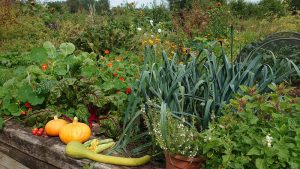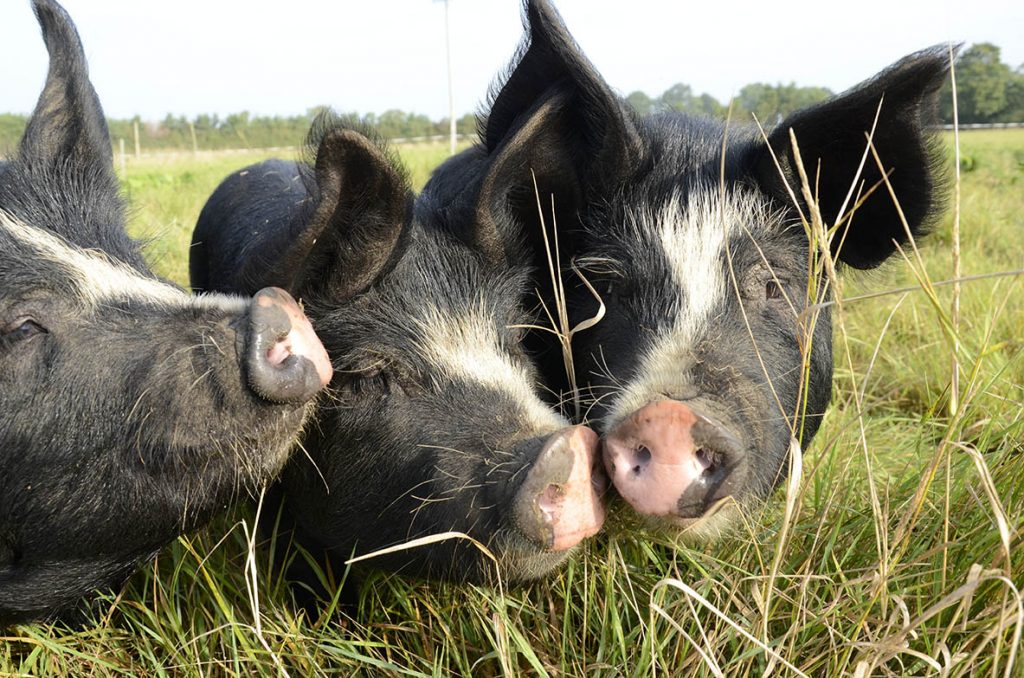Gardening, allotment and smallholder courses
Sally writes on a wide variety of gardening and smallholder topics and has put together two courses aimed at people with small
acreages, an allotment or garden

An introduction to growing fruit and vegetables
Course tutor: Sally Morgan
This popular course is aimed at people who are keen to grow vegetables or have taken on an allotment and want to learn more and to make their growing space more climate change resilient Cost £95This intensive full day course looks at growing organic fruit and vegetables. Everything starts with the soil so we look at soil, mulching and composting, making our own potting composts, and creating hugelkultur beds for added resilience.
Traditional crop rotations may not always be the best approach so Sally looks at alternative approaches, such as polyculture and continuous cropping. We will also cover the choice of vegetables and seed saving.
Sally has long been interested in climate change. In recent years she has been looking at how we can make our gardens more resilient to the changes and this resulted in The Climate Change Garden, which she wrote with Kim Stoddart. We will examine ways of increasing resilience to the extremes of climate through diversity, encouraging wildlife and natural biocontrols.
Perennial vegetables have a key role to play in the climate change garden. Sally has been growing a wide range of edible perennials at Empire Farm for many years. She is currently establishing a new perennial veg garden and she will discuss the options that are available including forest gardens, edible hedgerows and meadows.
This is followed by a session on growing soft and top fruits.
The day will include a tour of the kitchen gardens, greenhouse and allotments.
The cost of this course is £95. The numbers on these days are limited to 10 people. The price includes all tuition, course notes, a copy of one of Sally’s books, a light lunch and refreshments during the day. The day starts at 10 am, with arrival from 9.45 am. There is a final Q and A session and the course ends with afternoon tea and cake at about 4 pm.
Dates for 2023
Saturday 1 April
You can buy tickets for this event on Eventbrite
the challenge

Living on one acre or less
Course tutor: Sally Morgan
You don't need acres of land to have a smallholding, an acre or less is all you need to keep a couple of pigs, some poultry, have an orchard, grow loads of veg and keep some bees. Find out how you can achieve this on this full day course. Cost £95In one acre its possible to raise pigs and poultry, grow vegetables, herbs and soft fruits, have a large polytunnel, create a small orchard and edible hedgerow, grow lots of perennial vegetables, have compost bins and even grow your own willow for fuel. Sally likes to grow unusual veg, so expect to learn about quinoa, oca, yakon, skirret, salsify and butterbeans and more. You can even work towards self sufficiency in a rural garden. Sally’s productive walled garden has a small orchard, kitchen garden with dipping pond, cut flowers, and herb garden.
Learn how to plan your own mini farm to keep livestock such as chickens (both layers and meat), ducks, turkeys, pigs, even sheep and goats, and become self sufficient in vegetables.
The practical planning session looks at how much you can fit into the space and highlights the key points you have to consider such as access, zoning, aspect etc. Important principles such as soil management, fertility, crop rotation, companion planting will be covered together with the basics of keeping livestock, fencing and water harvesting. You will also look at the paperwork you need to keep animals, such as holding and herd numbers, movement licenses, and cover issues such as keeping animals in urban areas.
This course is run several times during the year. The content is varied to tie in with the season. The spring dates give you a chance to look at the vegetable plots early in the season while the summer / autumn dates enable you to appreciate the vegetable gardens and greenhouses at peak productivity.
The April date will focus on planning and rotations. The vegetable beds will be covered, the fruit cage will be planted up. The greenhouse will be full of newly sown modules and winter veg. The piglets and meat birds will not have arrived, but you will be able to see our Kune Kune pigs, poultry and bees kept elsewhere on the farm plus the flower farm and orchards. We look at topics such as composting, green manures, hugelkultur beds, and weed control. The advantage of this date is that you will have time to go home and get started yourself.
By early summer the veg beds will be full of the first plantings, the polytunnel planted up with salads, tomatoes and cucumbers and the piglets will have arrived. We may have some ducklings or meat bird chicks too. There will be a chance to walk around the small flower farm. Courses later in the year give participants the chance to see the vegetable gardens and polytunnel in full production, the pigs will be at porker weight and ready for slaughter and there will be some ducks and possibly turkeys around. Part of the day will look at planning for winter crops and the next year.
The cost of this course is £95. The numbers on these days are limited to 10 people. The price includes all tuition, course notes, a copy of one of Sally’s books, a light lunch and refreshments during the day. The day starts at 10 am, with arrival from 9.45 am. There is a final Q and A session and the course ends at about 4 pm.
Next available date in 2023
Sunday 2 April
You can buy tickets for this event on Eventbrite
Important information
Office: 01963 371681 Butchery courses 07937 174106
sally@empirefarm.co.uk